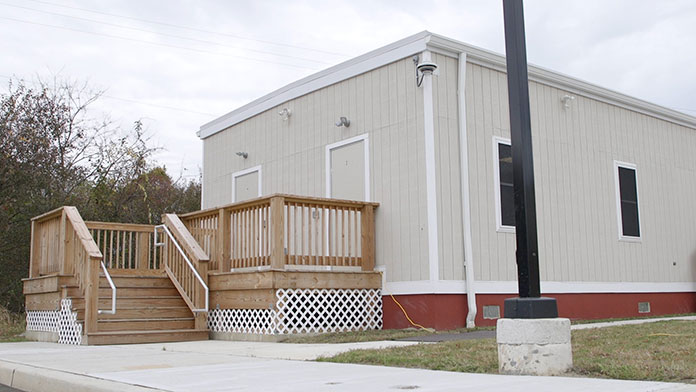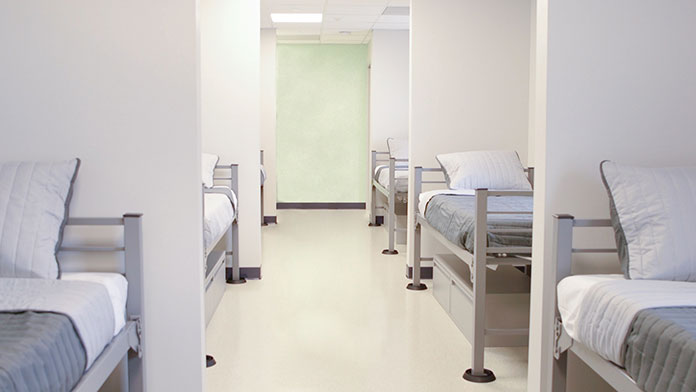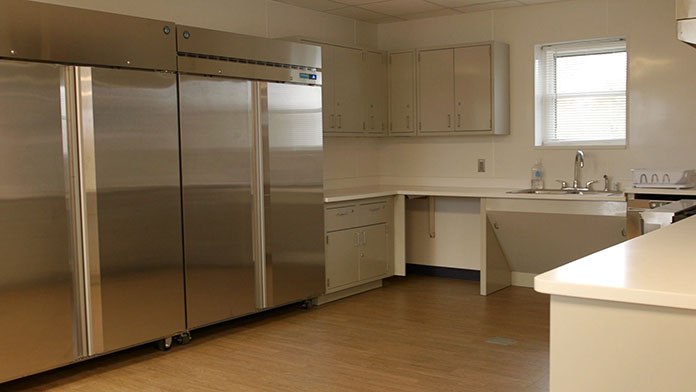
MONMOUTH COUNTY – An emergency shelter owned by the county government that opened nearly four years ago offers a short-term haven and services for adults in need.
The Oceanport facility, situated in the vicinity of the deserted Fort Monmouth complex, is not the first shelter to have been established in the region. A shelter on the Fort Monmouth premises since at least 1997 was severely damaged by Superstorm Sandy. Those in need found temporary shelter in Freehold until construction of the current building in 2019.
According to Monmouth County Commissioner Susan M. Kiley, the Fort Monmouth Economic Revitalization Authority (FMERA) facilitated grant funding for the construction of the current shelter through a one-time payment in the amount of $1.9 million due to the location of the original facility. The federal government does not play a current role in in the adult shelter operations, though the shelter does receive a small amount of federal HUD Emergency Solutions Grant dollars.
“Monmouth County provides $572,000 in annual funding toward shelter operations,” said Kiley, who serves as the Commissioner’s Liaison to the Department of Human Services. “There is another $55,000 in funding from various state entities and the U.S. Department of Housing and Urban Development (HUD).”
County officials have contracted the management of the H-shaped structure, which spans 4500 square feet, to a non-profit organization known as the Affordable Housing Alliance (AHA). The shelter has the ability to adjust wings and accommodations based on the needs of the residents.
“We have the capacity to help 16 people at one time,” said Peter Boynton, AHA’s Director of Community Action Program & Emergency Housing. “We’re relatively full most of the time.”
The Monmouth County Shelter’s demographics often defy the stigma associated with homelessness. Many of the people who take up temporary residence work regular jobs and simply cannot find affordable housing within their means. A few individuals placed at the shelter were in their early 90s, while others were as young as 18. Families with underage children are ineligible for interim housing within the facility.

No walk-in applicants are accepted at the shelter, and its location is not advertised to protect the privacy of those who live there.
AHA provides staffing for the shelter on a 24/7 basis, with at least two staff members on site regularly. In addition, a third individual drives a van to escort residents to necessary appointments and places of employment.
“Once an individual goes through the intake process, they’re part of the shelter 24 hours a day,” said Boynton. “During traditional business hours, we encourage individuals to become actively involved in the community. If they’re not out working, they should be looking for housing.”
Staff members cook three meals daily for those who stay at the shelter. Breakfast is made in time for those ready to head off to work. They also have the opportunity to take along a packed lunch and return home to another nutritious meal for dinner. Healthy snack options are available throughout the day.
Placements within the shelter normally are authorized for 30 days, although extenuating circumstances may warrant extensions. So, for example, someone who finds an apartment that the landlord says isn’t available for another couple of weeks won’t have to worry about landing out on the street.
Sometimes the extension request requires a bit of a more creative solution. If there are a large number of people on a waiting list for the shelter, the goal is to protect against overall hardship. The county could opt for a motel placement or work with a local church for a short interim stay.
“I think what makes the model we have here in Monmouth County successful is that it’s a collaborative one,” shared Boynton. “The county has really done a great job leading the charge and has reached out to other agencies to make sure they’re able to provide the best services to all involved in the process.”

Monmouth County Social Services screens individuals as part of its homeless intake unit. They are located at 3000 Kozloski Road, Freehold, and can be reached by phone at (732) 431-6000. Applicants must be county residents for at least 30 days to qualify for a temporary housing referral.
“There are many ways where an individual can prove residency within the county,” Boynton explained. “For example, if they were homeless and going to a soup kitchen or getting help from a food pantry in Monmouth County, that would work.”
AHA acts as one of the agencies operating in the county to provide affordable housing in addition to running the homeless shelter. The non-profit organization owns and operates over 400 units in Monmouth County and works with utility and rental assistance programs.

Grant-funded programs may be available for homeless individuals in search of stable housing. This could include security deposits and even rent for a few months in the future.
State law requires all counties to offer warming centers or shelter when there is extreme weather or colder than 32 degrees outside. Monmouth County officials have contracted with area motels to provide Code Blue assistance to those who are homeless or unsheltered. Those in need can dial 211 or contact their local police departments for referrals.
A report initiated by the federal government attempts to count the homeless population annually. HUD’s 2022 Continuum of Care Homeless Assistance Program’s report listed 8,752 homeless statewide. Monmouth County’s numbers alone rose by 40 percent from 2021 to 2022.






